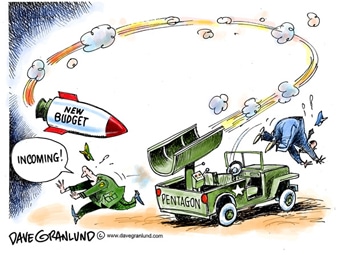 by Sherwood Ross
by Sherwood Ross
The $178 billion in cuts the Pentagon has proposed in its own budget “are largely illusory,” according to a report in the September 5th issue of “Bloomberg Business Week”(BBW) magazine.
About $106 billion, or 60 percent, of that sum is “unlikely to materialize” according to the magazine’s defense analyst Kevin Brancato. He says the cuts are questionable because “they lack detail, they include cuts that would have happened under existing practices, or they face likely challenges from Congress.”
Some of the Pentagon’s “cuts” are mere “vague statements” that “make it difficult, if not impossible, to identify real savings.” He gives a “for instance” of an $11 billion cut for items with such descriptions as “many smaller efforts across the enterprise” and “numerous other changes across a variety of activities.”
As for the Pentagon’s plan to save $6 billion by cutting 47,000 soldiers and Marines starting in fiscal 2015, that’s questionable “because it depends on when U.S. forces leave Iraq and Afghanistan,” Brancato told the business publication.
Gordon Adams, who formerly oversaw national security budgeting in the Office of Management and Budget under President Clinton, is quoted by BBW as saying Congress could knock off $1 trillion, or 15 percent, of the Pentagon’s projected $6.7 trillion spending proposed for the next decade by reducing personnel.
“More than a third of the active-duty force of 1.4 million troops never deploys. Overhead, including support staff and other noncombat positions account for about 42 percent of the defense budget,” according to Adams, BBW says, who adds, “There’s not a business alive that does 42 percent overhead.”
‘Including the cost of the wars, defense spending has doubled in the past decade, to $691 billion in fiscal 2010 from $316 billion in fiscal 2001,” BBW reported. However, defense spending is expected to decrease by at least $330 billion in the next decade under the debt-reduction bill President Obama signed into law August 2n
Probably most Americans have no idea of the enormity of military spending and its impact on their daily lives. The F-35 Joint Strike Fighter, what BBW calls, “the most expensive program in Pentagon history,” will pump “almost $500 billion” into the coffers of primary contractors Lockheed Martin and Pratt & Whitney. The bill is even higher if one includes the outlays to 1,300 other suppliers. Roughly speaking, the Pentagon spends more each year for war than all 50 states spend for all purposes, such as education, road-building, water supply, payroll, law enforcement, etc., as it gobbles up about 54 percent of every tax dollar. So much funding is going to the Pentagon that grants to states and cities have been cut back and countless workers have been laid off.
Military spending has soared in part because the Pentagon has abandoned free enterprise competition in favor of no-bid awards to contractors. These soared from about $82 billion in 2001 to more than $170 billion last year, BBW reported, largely during the tenure of Commander-In-Chief President George W. Bush. As for the archaic capitalist notion of “pay-as-you-go” President Bush’s wars are costing Americans more than $3 trillion, virtually all of it borrowed and on which taxpayers will be paying hundreds of billions of dollars in interest for years to come. The wars not only take tax dollars out of the pockets of American families but impact their financial situation in ways they may not recognize.
“This hemorrhaging of money has collateral effects on the US economy,” writes Hugh Gusterson, an anthropologist at the George Mason University in Virginia. “All that government borrowing makes it harder for consumers to borrow money, pushing payments on the average American’s mortgage up by $600 a year, for example.” (He might have added it also makes it harder for small businesses to borrow.)
In an article in the “Bulletin of The Atomic Scientists” September 8th, he writes, “The wars have also driven up the price of oil, thus magnifying the recession, and they have siphoned off over $3 trillion that could have been invested in the renewal of US infrastructure.”
Or in jobs, Gusterson adds. He points out that $1 million spent on the military creates 8.3 jobs, whereas $1 million spent on education creates 15.5 jobs and $1 million spent on health care creates 14.3 jobs. “If we estimate that the Pentagon spent $130 billion a year directly on the wars, that money, if spent at home instead, would have created 900,000 US jobs in education or 780,000 US jobs in health care.”
Today, President Obama, who inherited two wars from Mr. Bush, is waging wars in a grand total of six countries, counting Pakistan, Libya, Yemen and Somalia, and has his military eyes gazing at another war-in-waiting in Colombia. As UPI reported just yesterday:
“The clandestine U.S. campaign to counter Islamist forces in Somalia appears to be growing daily, with allegations the CIA is running covert operations from a base at Mogadishu airport.”
Compare Obama’s record with that of President Thomas Jefferson, who could proudly write after leaving office:
“I have the consolation to reflect that during the period of my administration not a drop of the blood of a single fellow citizen was shed by the sword of war…”
Sherwood Ross runs a public relations firm that consults globally for good causes. He also contributes articles on defense and political issues. He formerly worked for major wire services and daily newspapers. Reach him at sherwoodross10@gmail.com).

Sherwood Ross is an award-winning reporter. He served in the U.S Air Force where he contributed to his base newspaper. He later worked for The Miami Herald and Chicago Daily News. He contributed a weekly column on working for a major wire service. He is also an editorial and book publicist. He currently resides in Florida.
ATTENTION READERS
We See The World From All Sides and Want YOU To Be Fully InformedIn fact, intentional disinformation is a disgraceful scourge in media today. So to assuage any possible errant incorrect information posted herein, we strongly encourage you to seek corroboration from other non-VT sources before forming an educated opinion.
About VT - Policies & Disclosures - Comment Policy



